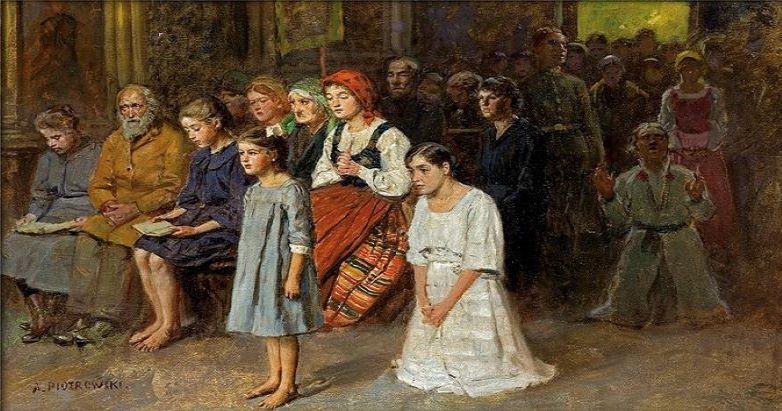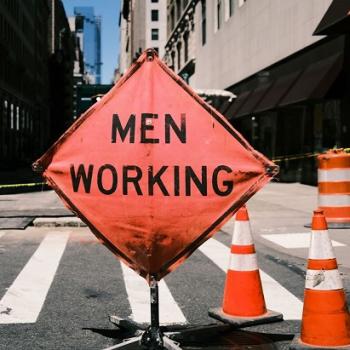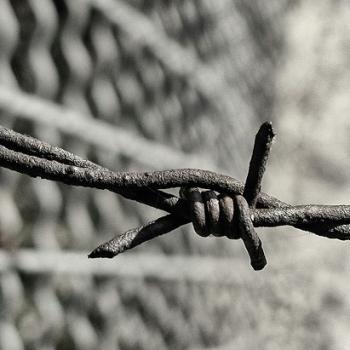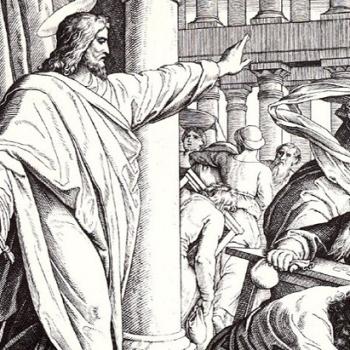
Why Christianity and Feminism?
Christianity and feminism can be mutually inclusive: if Jesus saves us from sin’s horrible consequences, including patriarchy, then feminism – which (very broadly) aims to restore the gender equality lost in the Fall – ultimately needs Jesus.
Despite this natural affinity between Christianity and feminism, I probably wouldn’t identify as a feminist (although I’ve always been a Christian) if not for a negative experience I had in church as a girl. As I learn from other Christian women’s stories and reflect on my own, I’ve perceived that many church cultures create a false dichotomy between Christianity and feminism. I was pressed into this harmful paradigm as a girl, but I believe that God himself gave me, and is still giving me, the strength to resist it – and the vestiges of patriarchy that continue to cast a dark shadow over the church.
You can’t resist what you can’t see, so the Lord used a bad experience to open my eyes to the truth.
The Red Pill
I’m a huge fan of sci-fi, and in one of my favorite scenes from the movie The Matrix, Morpheus – the leader of the resistance – reveals to Neo that Neo is essentially “asleep” in a computer-generated world known as the matrix: “It is the world that has been pulled over your eyes to blind you from the truth…that you are a slave…born into a prison for your mind,” Morpheus explains. He then gives Neo a choice: to take the blue pill and return to his old life; or to take the red pill – and see how far the rabbit hole goes.
Neo takes the red pill. And so the story begins.
Here’s my story.
Girl Power
In elementary school, I was an acolyte at an Episcopal church. Since my dad was organist-choirmaster, and my mom sang in the choir, I suppose I naturally gravitated toward my own worship niche, and acolyting was a way for me to contribute. I almost always carried a torch, symbolizing the light of Christ, although sometimes I’d carry a flag or liturgical banner.
When I was in middle school, my dad got a new job at another Episcopal church. He had great respect for our new church’s rector, whom I will refer to as Bob (not his real name), and I remember our family sharing a fun meal with him and his wife at a Mexican restaurant shortly after my dad was hired. However, Dad warned me that Bob did not allow female acolytes. According to my dad, Bob saw the acolyte’s role as a preparation for the priesthood, and women should not be priests. Besides, per Bob (as communicated by my dad), when you open an acolyte program to girls, they take it over!
At the time, I just considered Bob’s views to be ridiculously old-fashioned. Now as an adult, I marvel at his hypocrisy. He fretted over a hypothetical female “takeover” of the acolytes while mandating an actual male takeover of the acolytes. His argument no more justifies his marginalization of girls than Jim Crow laws justified barring blacks from voting so that they wouldn’t “take over” local governments. christianity and feminism
Patriarchy: A Tower of Babel
Of course, my parents did not agree with Bob on this issue, but my dad felt it was not his place, as a church employee, to oppose his boss. However, my parents fully supported me meeting with Bob for a discussion of the topic.
I went into our meeting with a simple agenda: to understand why Bob thought the way he did and to share my perspective with him. While I disagreed with his views, I wasn’t prepared to oppose him per se or to justify myself. Perhaps I should have been more prepared, but I was only 13 or 14 at the time. I knew that Bob probably perceived Christianity and feminism as incompatible, but I barely knew what feminism was.
I left our meeting confused. Bob never asked me about my perspective, and I didn’t share it. In fact, I think I forgot myself entirely because I was so focused on trying to figure out what he was saying. He didn’t make any sense to me. When Dad asked me after the meeting what Bob said, my response was: I don’t know. To this day, I don’t know what he said. I know that Bob spoke in English, using words that were intelligible, within sentences that sounded legitimate; I even think he may have spoken of a story from the Bible, in the Old Testament, that was possibly allegorical to the point he wanted to make. But whatever that point was – and the substance of anything he said that day – totally eluded me. It was as if he were speaking babble.
As a parting gift, he gave me a book by Elisabeth Elliot, Let Me Be a Woman. Some time later, while perusing the church library, I wondered why there were so many copies of that book there. It felt as if there must be some personal history between Bob and this author.
The book itself was a different kind of “babble” that I would call nonsense – passionate nonsense on the supposed Biblical basis for women’s subordination to men and why women are supposed to celebrate, even demand, patriarchy, co-opting the language of feminism (let me be a woman!). For Elliot, one of the most influential advocates of what has become known as “biblical womanhood,” Christianity and feminism are mutually exclusive. Yet Elliot’s claims in the book aren’t well-delineated or supported. Her most contentious assertions are based on Biblical passages that I now know were probably not intended to support patriarchy, which she assumes as their “obvious” meaning.
When you approach the Bible through the warped hermeneutic of patriarchy, it will warp your exegesis accordingly. Like a dark tower, patriarchy casts a tall shadow over God’s word, obscuring its message and occupying spaces where it doesn’t belong, to the detriment of God’s kingdom.
Consider the Pauline household codes. Paul’s admonition, “slaves, obey your masters,” wasn’t intended to justify slavery any more than “wives, obey your husbands” was intended to justify patriarchy. But when you try to force these texts to fit within a framework of white (or male) hegemony, you will necessarily misunderstand what they mean and potentially misuse them to grievous effect.
Many abolitionists challenged “pro-slavery” interpretations of the household codes as inaccurate and abusive. Now feminists challenge “pro-patriarchy” interpretations of the household codes as inaccurate and abusive. Complementarians who use these verses to justify their stance need to understand that they are on the wrong side of history. To this point, according to Beth Allison Barr, Pope John Paul II suggests in his writings that using the household codes to justify male headship/female subordination is equivalent to using the codes to justify slavery (The Making of Biblical Womanhood, 45).
The truth is that we fallen human beings are really good at finding ways to create, enforce, legitimize, and perpetuate social hierarchies, be they of gender, race, or class. The apostle Paul knows that, and although he makes it clear in Gal. 3:28 that these differences are not germane to the Kingdom of God, we haven’t yet internalized this difficult teaching – or we find ways to de-fang it. Historically, we Christians have been really bad at discerning the destructive constructs of power at work within our churches and, most perversely, have even found ways to celebrate them.
Elliot’s book Let Me Be a Woman wasn’t just inaccurate, poorly sourced, and shallow. It was hurtful, personally and corporately: Kingdom-damaging material. After reading it, I shed a few tears, but they didn’t match the horror I felt. Her distortion of biblical texts in the shadow of (and in service to) patriarchy, misusing the submission of Christ to champion male/female relational perversions, deserved lamentation beyond my capacity.
But what could I do? I was just a young teen, and I had no further recourse. I couldn’t even articulate my feelings, at least not with the precision I can now, as an adult, yet they burned within me. So I resolved to burn Let Me Be a Woman, along with a copy of Bram Stoker’s Dracula, which I’d read as a child and later deemed to be a negative spiritual influence in my life. As Dad helped me incinerate the books in an old charcoal burner, I remember thinking: they deserve each other. Little did I know that the books’ characters actually had something in common.
Later, I would rip pages out of my Bible from Paul’s epistles containing passages that I thought were demeaning to women. So much for Christianity and feminism. I wouldn’t make peace with Paul until years later, when I studied these texts again with Rev. Dr. Chris Bryan at Sewanee’s School of Theology.
Christianity and Feminism: More Analogies to Race
In the meantime, as a young teen, I remained faithful though frustrated. That Christmas, Bob invited me to read in front of the church the first Bible lesson for our Lessons and Carols service, which relates the fall of Adam and Eve. His seemingly flattering gesture gave me pause; this text, which includes the infamous line, “and he shall rule over you” (Gen. 3:16), was one of those I knew he might be misusing to justify patriarchy. While I could read those verses without inferring a divinely-ordained sexual hierarchy, I suspected Bob entertained a different interpretation. I couldn’t bear to read these words in his hearing, at his personal invitation.
I’ll try to illustrate my sense of unease, in case it’s unclear, with an analogy: imagine a rector who believed (as some Christians once did) that various Biblical passages justify Jim Crow laws and segregation. One day, the rector invites a black parishioner, a child – a child he has shared his views with, who disagrees with him, and who cannot participate in church activities the way whites can, because of the rector’s views – to read in front of the church those Biblical passages containing the household codes: slaves, obey your masters.
Try to put yourself in this black child’s shoes. How would you feel?
Years later, when I was in college, I learned that the church had effectively fired Bob, telling him at the end of a sabbatical not to return. He and his wife were both very hurt, and my parents desponded about how events unfolded. They thought he deserved better.
As for me – I was happy. It didn’t bother me in the least either that Bob was gone or the way he was dismissed. It’s not that I despised him personally or thought that he should’ve been treated poorly. But I felt that his departure was a positive thing, and how it happened mattered far less to me than the fact that it had. While I was too old then to acolyte, I was pleased that girls began acolyting as soon as he was gone.
I pondered these events recently, decades later, after reading Barr’s book on biblical womanhood. In the book, she shares her experience of patriarchy as the wife of a church employee. The pain she describes, the isolation, made me reflect afresh on my own experience of exclusion. I realized it was an unacknowledged wound – not a catastrophic one, but one I could still make out, the same way you might feel the faint contours of scar tissue from an old injury if you trace over the skin very carefully with your fingertips.
The Dark Legacy of Elisabeth Elliot
As I explored the geography of this forgotten wound, I began to wonder what became of Bob.
At some point I think he was hired by an ACNA church led by a rector with reportedly extreme conservative views. This rector was later dismissed for alleged sexual misconduct, including grooming of young (male) aspiring priests. While Bob is no longer at this church, he remains active, at least in name, in the echelons of ACNA leadership. christianity
As for Bob’s past, when I started digging more, I discovered his personal connection to Elisabeth Elliot. He was the rector of her church in Wenham, Massachusetts. He knew her. He must have been influenced by her legacy, not just the positive and inspiring legacy of her missionary work but of a legacy later tarnished by her reactionary, anti-feminist views to which everything, even the Word of God, was forced to conform.
Elliot’s acolytes of “biblical womanhood” are all part of her legacy. Thanks to Bob, I’m now part of her legacy too, every bit as much as they are. I’m just subverting it. Because through the Bible, out from under the hermeneutic shadow of patriarchy, I see patriarchy for what it really is: a tower of idolatry.
Toppling Babel christianity and feminism
I’ve come to realize that this childhood experience is more than a painful inflection point; it’s also a gift. As I examine these old memories, I keep returning to that conversation in Bob’s office. What happened there? What did he really say? Did God send an angel to obfuscate his speech? I now thank God that Bob’s words were somehow inscrutable to me. I thank God that I was spared his false teachings on gender relations, at least from his own mouth, where they might have done more damage. The child I was had been prepared to receive from Bob some grand, convincing theory of patriarchy, a compelling reason to uncouple Christianity and feminism, but what I received instead was the gift of babble. Babble, God’s gift to the children of Noah, halted the construction of their tower of idolatry and ultimately forced them to conform to God’s will (Gen. 11).
Patriarchy – this tower of idolatry, this Babel – may not have gained a foothold in my heart, but it continues to cast a tall shadow over the church.
The Babel of patriarchy is sustained by the sin plaguing our world because of the Fall. As God describes to Eve: “I will make your pangs in childbirth exceedingly great; in pain you shall bring forth children, yet your desire shall be for your husband, and he shall rule over you.” (Gen 3:16). That a hierarchical relationship between the man and woman is first presented after the Fall as a consequence of sin indicates that patriarchy, like pain during childbirth, is fundamentally unnatural and undesirable. As gender relations conform to the kingdom of man, rather than to the Kingdom of God (shouldn’t God be the one “ruling over” woman?), we repeat the ancient idolatry of Noah’s children – under the pretense of “godliness” and “biblical womanhood.”
The good news for women (and men) is that Christ came to destroy the consequences of the Fall, big and small, from death, to patriarchy, and everything in between. As we sing in Joy to the World, “He comes to make his blessings flow far as the curse is found.”
We can rejoice that no stronghold of idolatry – especially one cradled by the church – shall be spared the blessing of Christ’s judgment.












